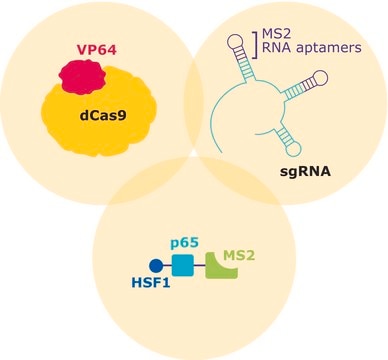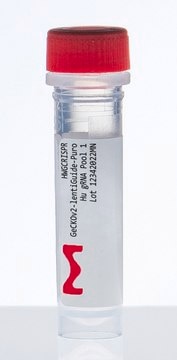CRISPRILIB
Human Whole Genome and Long Non Coding CRISPRi Library Kit
About This Item
Recommended Products
packaging
pkg of 80 vials (4x50μL aliquots for each of the 20 kit components)
application(s)
CRISPR
shipped in
dry ice
storage temp.
−70°C
Related Categories
General description
Human Whole Genome and Long Non Coding CRISPRi Library Kit contains 17 sub-pools of top 5 gRNAs per gene as well as a separate sub-pool of 5 supplemental gRNAs per gene for increased sensitivity and includes non-targeting controls built in. All pools are functionally titered based on # of guides to provide approximately 3 replicates depending on cell line at 500 gRNAs per cell. Vectors contain both BFP and puromycin as selection markers and an optimized scaffold for sgRNA expression and function. Each sub pool of the library includes non-targeting sgRNA controls. The UCOE KRAB-dCas9 effector is designed for consistent expression and inhibition allowing gene silencing loss-of-function screening with less risk of toxicity to your cells due to double stranded breaks which make the CRISPRi system the ideal choice for perturbation of non-coding genes, applications that call for a reversible, titratable solution, and essential genes.
- Individual CRISPRi clones are easily ordered online or by contacting your local sales representative
- Custom pools for follow up screening or 10x Genomics Compatible CRISPR pools are also available by contacting your local sales representative
For more information about screening with CRISPRi/a please Click Here.
Application
- Functional Genomics/Target Validation
- Unbiased wholed genome forward genetic screening
- Set up and optimization of screen assay
- Creation of cell lines stably expressing KRAB-dCas9
- Validated positive and negative controls
Features and Benefits
- Complete ready to use whole genome CRISPRi libarary targeting protein coding and long non-coding RNAs
- Best in Class UCSF gRNA selection algorithm and optimized (F+E) gRNA scaffold
- Ease of optimization: Validated positive control targeting RAB1A and non-targeting control for assay set up
- UCOE KRAB-dCas9 for consistent effector expression across a wide variety of cell lines
- Libraries provided at high functional titer, based on FACs or CFU analysis
- Use puromycin and or BFP as selection markers
- Gene targets from UCSF organized into functional categories, both coding and lncRNA Kinases, Phosphatases, Drug Targets Cancer and Apoptosis Stress and Proteostasis Mitochondria, Trafficking, Motility Gene Expression Membrane Proteins, Unassigned (Novel Targets)
Components
CRISPRIL1: CRISPRi Pool H1 Top5 Kinase Phosphatase Drug Targets
CRISPRIL2: CRISPRi Pool H1 Supp5 Kinase Phosphatase Drug Targets
CRISPRIL3: CRISPRi Pool H2 Top5 Cancer Apoptosis
CRISPRIL4: CRISPRi Pool H2 Supp5 Cancer Apoptosis
CRISPRIL5: CRISPRi Pool H3 Top5 Stress Proteostasis
CRISPRIL6: CRISPRi Pool H3 Supp5 Stress Proteostasis
CRISPRIL7: CRISPRi Pool H4 Top5 Mitochondria Trafficking Motility
CRISPRIL8: CRISPRi Pool H4 Supp5 Mitochondria Trafficking Motility
CRISPRIL9: CRISPRi Pool H5 Top5 Gene Expression
CRISPRIL10: CRISPRi Pool H5 Supp5 Gene Expression
CRISPRIL11: CRISPRi Pool H6 Top5 Membrane Proteins
CRISPRIL12: CRISPRi Pool H6 Supp5 Membrane Proteins
CRISPRIL13: CRISPRi Pool H7 Top5 Unassigned
CRISPRIL14: CRISPRi Pool H7 Supp5 Unassigned
CRISPRIL15: CRISPRi Pool Long Noncoding iPSC and Common Cancer Cell Lines 1
CRISPRIL16: CRISPRi Pool Long Noncoding iPSC 13
CRISPRIL17: CRISPRi Pool Long Noncoding Common Cancer Cell Lines 2
2 Controls and 1 Effector Construct with a minimum concentration of 5x105 TU/mL(via FACS or CFU assay)
CRISPRIE: KRAB-dCAS9 CRISPRi Construct Lentiviral Transduction Particles
CRISPRI01: CRISPRi Rab1a Control Lentiviral Transduction Particles
CRISPRI06: CRISPRi Nontargeting Control Puromycin Transduction Particles
Principle
Storage Class
12 - Non Combustible Liquids
wgk_germany
WGK 3
Certificates of Analysis (COA)
Search for Certificates of Analysis (COA) by entering the products Lot/Batch Number. Lot and Batch Numbers can be found on a product’s label following the words ‘Lot’ or ‘Batch’.
Already Own This Product?
Find documentation for the products that you have recently purchased in the Document Library.
Articles
This screening guide covers how to choose a cell line, a screening library, and experimental conditions as well as tips for designing and performing your experiment.
CRISPR lentiviral screening libraries are powerful research tools. Continuing a decade long commitment to library screening manufacturing, we have partnered with 10x Genomics to bring 10x Feature Barcode-compatible pooled screening products to you.
Our team of scientists has experience in all areas of research including Life Science, Material Science, Chemical Synthesis, Chromatography, Analytical and many others.
Contact Technical Service


